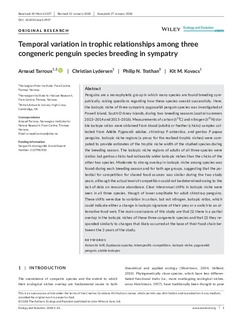Temporal variation in trophic relationships among three congeneric penguin species breeding in sympatry
Journal article, Peer reviewed
Published version

Åpne
Permanent lenke
http://hdl.handle.net/11250/2493250Utgivelsesdato
2018Metadata
Vis full innførselSamlinger
- Publikasjoner fra CRIStin - NINA [2364]
- Scientific publications [1392]
Originalversjon
10.1002/ece3.3937Sammendrag
Penguins are a monophyletic group in which many species are found breeding sympatrically,
raising questions regarding how these species coexist successfully. Here,
the isotopic niche of three sympatric pygoscelid penguin species was investigated at
Powell Island, South Orkney Islands, during two breeding seasons (austral summers
2013–2014 and 2015–2016). Measurements of carbon (δ13C) and nitrogen (δ15N) stable
isotope ratios were obtained from blood (adults) or feather (chicks) samples collected
from Adélie Pygoscelis adeliae, chinstrap P. antarctica, and gentoo P. papua
penguins. Isotopic niche regions (a proxy for the realized trophic niches) were computed
to provide estimates of the trophic niche width of the studied species during
the breeding season. The isotopic niche regions of adults of all three species were
similar, but gentoo chicks had noticeably wider isotopic niches than the chicks of the
other two species. Moderate to strong overlap in isotopic niche among species was
found during each breeding season and for both age groups, suggesting that the potential
for competition for shared food sources was similar during the two study
years, although the actual level of competition could not be determined owing to the
lack of data on resource abundance. Clear interannual shifts in isotopic niche were
seen in all three species, though of lower amplitude for adult chinstrap penguins.
These shifts were due to variation in carbon, but not nitrogen, isotopic ratios, which
could indicate either a change in isotopic signature of their prey or a switch to an alternative
food web. The main conclusions of this study are that (1) there is a partial
overlap in the isotopic niches of these three congeneric species and that (2) they responded
similarly to changes that likely occurred at the base of their food chain between
the 2 years of the study.
